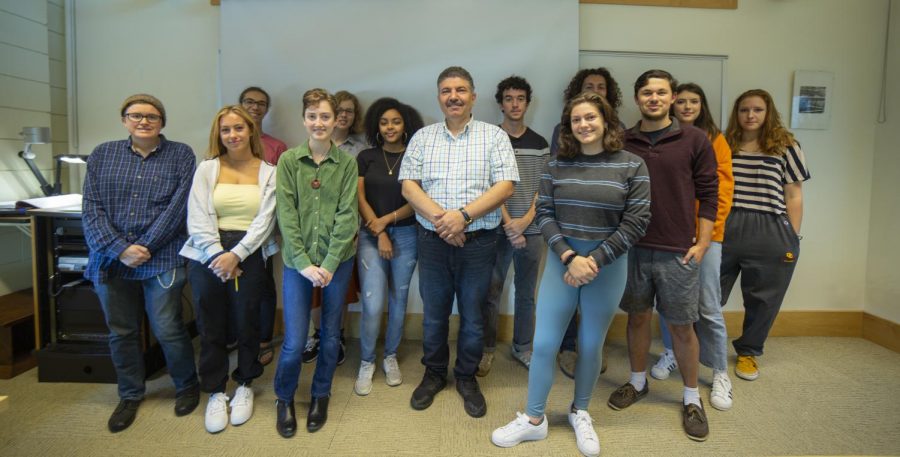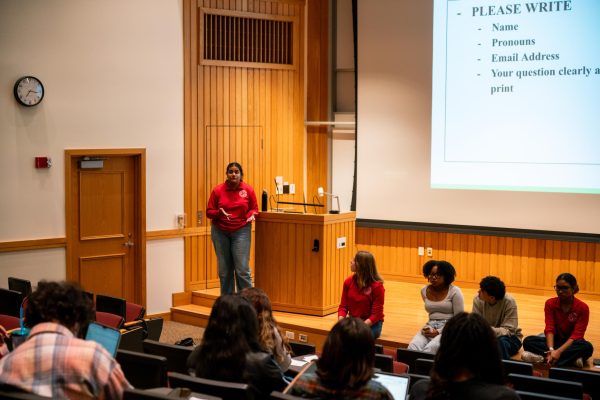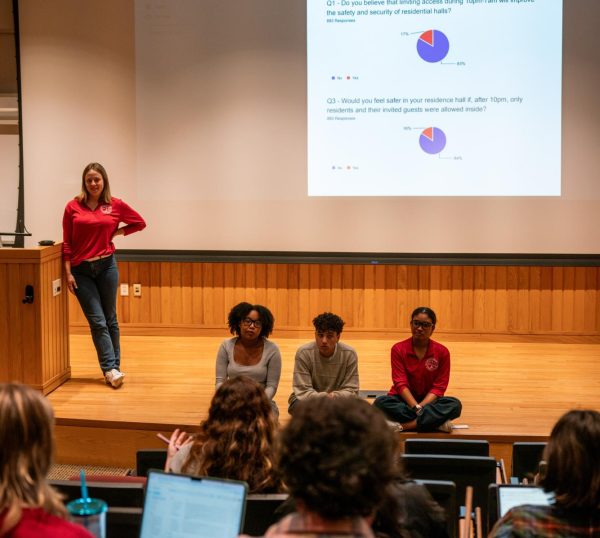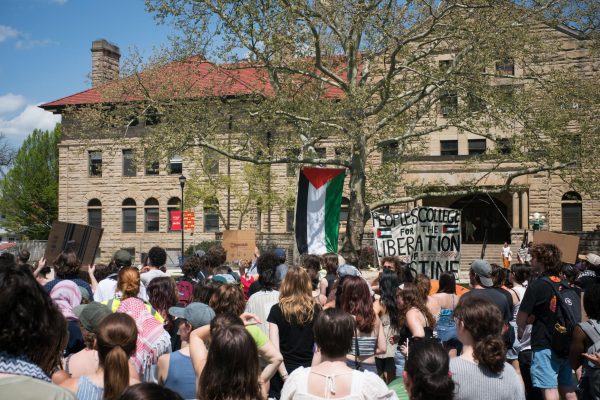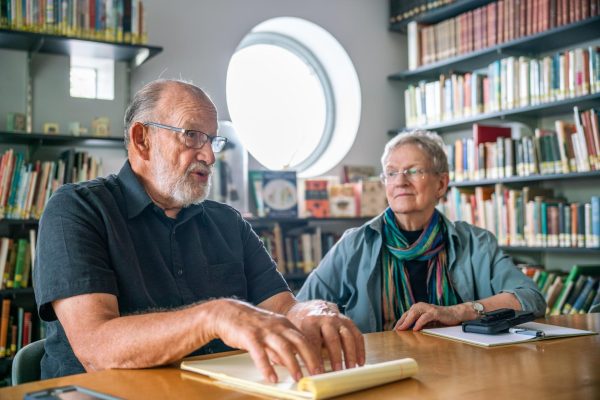Introductory Arabic Courses Offered On Campus in Fall, Spring
Students in the Arabic 101 course taught by Visiting Assistant Professor of Arabic Mahmoud Meslat. Following a faculty petition this spring, the College Faculty Council approved introductory Arabic courses for both the fall and spring semesters.
Following significant controversy last spring, Oberlin will once again offer introductory Arabic courses on campus this academic year. In April, a group of faculty petitioned the College Faculty Council with a proposal to offer a section each of Arabic 101 and 102. Visiting Assistant Professor of Arabic Mahmoud Meslat was hired over the summer to teach the introductory courses.
“As is our process, a group of faculty submitted a request for a temporary line in Arabic to the [Educational Plans and Policies Committee] and the [College Faculty Council],” acting Dean of the College of Arts and Sciences David Kamitsuka wrote in an email to the Review. “The CFC authorized two courses, one in the fall and one in the spring.”
The request followed news last spring that Oberlin would transition intermediate and upper-level Arabic courses to a digital classroom platform called the Shared Language Program, a partnership among several institutions in the Great Lakes Colleges Association. For some, the transition stoked fears that on-campus Arabic offerings would be eliminated, particularly after it was announced that former Visiting Assistant Professor of Arabic Basem Al-Raba’a would not return.
Meslat, Al-Raba’a’s replacement, has taught at Oberlin twice before, from 2011–2013 and 2014–2016. He was an integral part of building up Oberlin’s Arabic program to include celebrations of the Arabic language like Arabic Day, cultural activities, parties, and field trips.
“Students emailed me and wanted me to come back, and I also heard from [Associate Dean of the College of Arts and Sciences Elizabeth Hamilton that] they wanted me to come back,” Meslat said.
Initially, the plan was for Meslat’s introductory courses to complement higher-level courses offered digitally through the SLP. Over the summer, the College successfully participated in some workshops with the technology. However, logistical challenges with a faculty member at Denison University led to Oberlin pulling out of the program for this fall. College senior Simon Idelson was among those planning on taking advanced Arabic courses through the SLP before learning that these courses would no longer be offered.
“The instructor was unfortunately unable to teach the fall SLP courses in Arabic, so they had to be cancelled,” Hamilton said in an email to the Review. “Half-course private readings were arranged to accommodate the students who were enrolled in the distance learning courses.”
Despite the setback, Kamitsuka clarified that Oberlin plans to participate in the SLP in the future.
“The Shared Language Program is an exciting opportunity for all language and culture faculty from across the Great Lakes Colleges Association to collaborate for the purpose of offering as many learning opportunities as possible for students,” he wrote.
The decision to continue introductory Arabic courses on campus follows significant student activism around the issue last spring. The student campaign, known as “Save Arabic,” launched a petition calling for a sustainable funding model for an Arabic program that garnered over 1,500 signatures, coordinated in part by College senior Caitlin Kelley.
Kelley, along with Professor of German Steven Huff; Professor of Russian Thomas Newlin; Ruberta T. McCandless Professor of French Matthew Senior; Presidential Scholar in Islamic Studies Mohammad Jafar Mahallati; and Associate Professor of History Zeinab Abul-Magd wrote a proposal to the College Faculty Council last spring to request funding for one professor to teach at least the introductory classes.
“We thought it was really important to have Arabic 101 and 102 on campus continuously as we worked together with the dean’s office and the MENA program to come up with more permanent solution and more permanent program that is under the jurisdiction of the relevant faculty bodies,” Kelley said.
Kelley says an outside, four-year grant funded the last three years of on-campus Arabic. Therefore, the dean’s office had administrative control of the faculty line rather than faculty governance bodies like the Educational Plans and Policies Committee, which normally oversees faculty lines. Due to low enrollment trends over several years, the dean’s office decided to not renew Al-Raba’a’s contract into the fall.
Some concerns do exist about hiring Meslat as a visiting professor. Kelley mentioned low pay as a barrier to keeping visiting faculty on campus. Idelson added that the lack of an Arabic TA on campus adds to concerns about the program’s long-term sustainability.
Kamitsuka said that further steps need to be taken for the position to become permanent, and added that he hopes enrollment will reach levels that he views as sustainable.
“As is our practice, the appropriate faculty will need to submit a request for position to EPPC and CFC for a continuing position,” Kamitsuka wrote. “This process assures a fair vetting of all requests for faculty lines from across the College of Arts and Sciences.”
Going forward, Kelley hopes to work with Hamilton and others to review the Arabic program and look for ways to better integrate it with other curricular offerings on campus.
“Arabic is such a relevant thing to be teaching, “ Kelley said. “Especially at Oberlin. Especially now. It just connects to so many things. It connects to history, it connects to political science, it connects to international relations, and is something that is increasingly important in the world.”
For his part, Meslat is looking forward to being back on campus and working with Oberlin students again.
“I love Oberlin,” he said. “Oberlin has always been a great institution. Oberlin has a beautiful diversity … I have beautiful students.”


